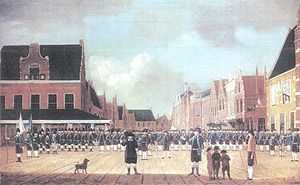Patriots (Dutch Republic)

- For other Patriot political parties, see Patriot Party (disambiguation)
The Patriots (Dutch: Patriotten, pronounced [paːtriˈjɔtə(n)]) were a political faction in the Dutch Republic in the second half of the 18th century. They were led by Joan van der Capellen tot den Pol, gaining power from November 1782.
The Patriots struggled for the removal of stadtholder William V, Prince of Orange. Discontented with the hereditary system of allocating posts, the decline of Dutch East India Company Asian trade, unemployment in the textile industry, the course of the Fourth Anglo-Dutch War and desiring more democracy, the middle and upper classes looked towards the United States and its Declaration of Independence and the Dutch Act of Abjuration and began to reclaim their rights (first written down in the 1579 Union of Utrecht). The lower classes largely remained supportive of the existing regime.
They formed militia or paramilitary groups like the Exercitiegenootschappen, who tried to persuade the prince and city governments to allow non-Calvinists into the vroedschap. The aristocrats were divided, into Orangists, republicans and democrats, and from summer 1785 more and more republicans backed the prince. The prince was unwilling to carry out reforms, yet unable to take necessary decisions. In the city of Utrecht the Orangist members of the government were sent home by the local militia under Quint Ondaatje, a burgher from Colombo. Another big name, Herman Willem Daendels, failed to get a seat in the local government, when state troops occupied the small city of Hattem.
In September 1787, after the local militia was defeated by a Prussian army under Charles William Ferdinand, Duke of Brunswick, many of the Patriots fled to France, settling in the area around Dunkirk, where they were able to understand the Flemish Dutch spoken locally.
In the Dutch Republic five leaders were sentenced to death and, although none of these sentences were carried through, all five were forced to leave the Netherlands. In 1789, two radical leaders Francis Adrian Vanderkemp and Adam Gerard Mappa moved to the USA at the invitation of George Washington. In 1795, a few years after the French Revolution, the Patriots remaining in Northern France returned and with the help of a French army founded the Batavian Republic.
Sources
- Schama, S., Patriots and liberators - Revolution in the Netherlands, 1780-1813 (4th edition, Amsterdam 2005).